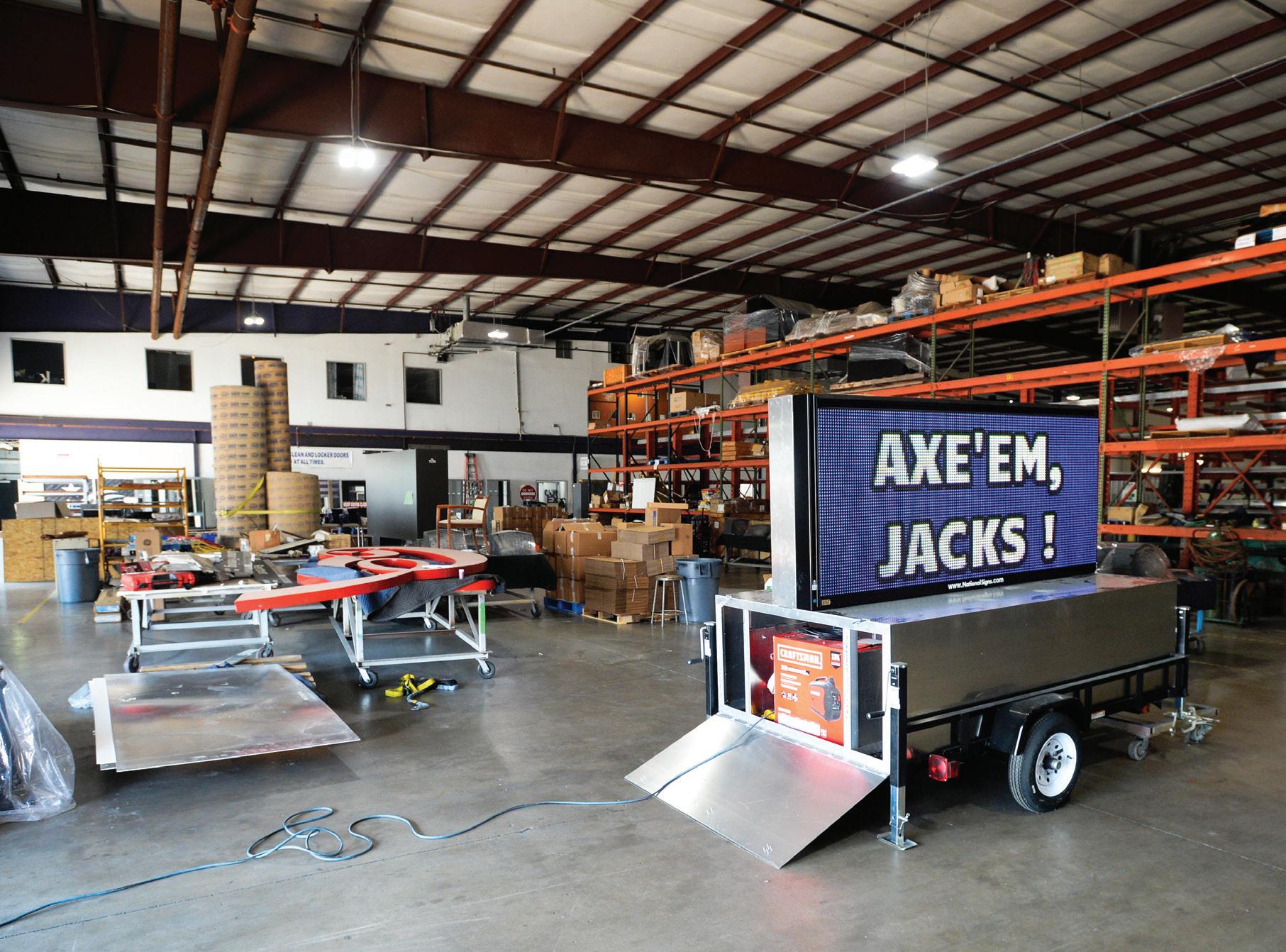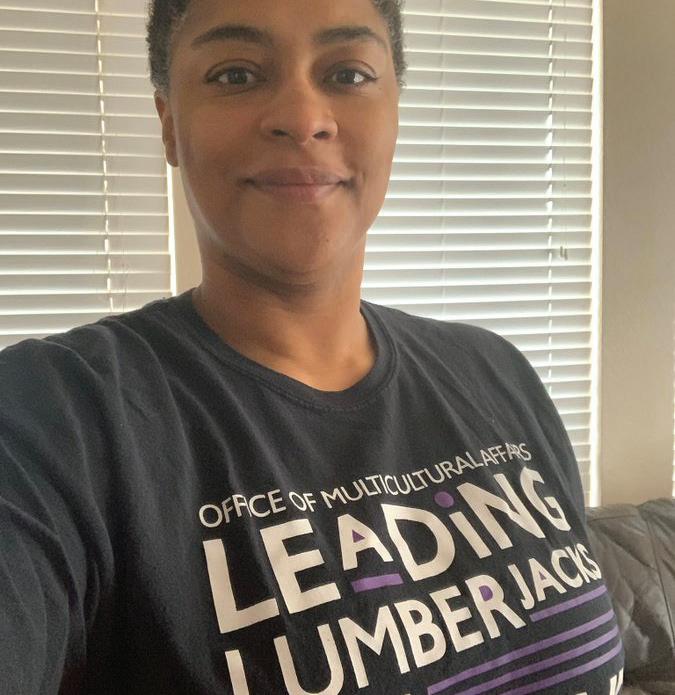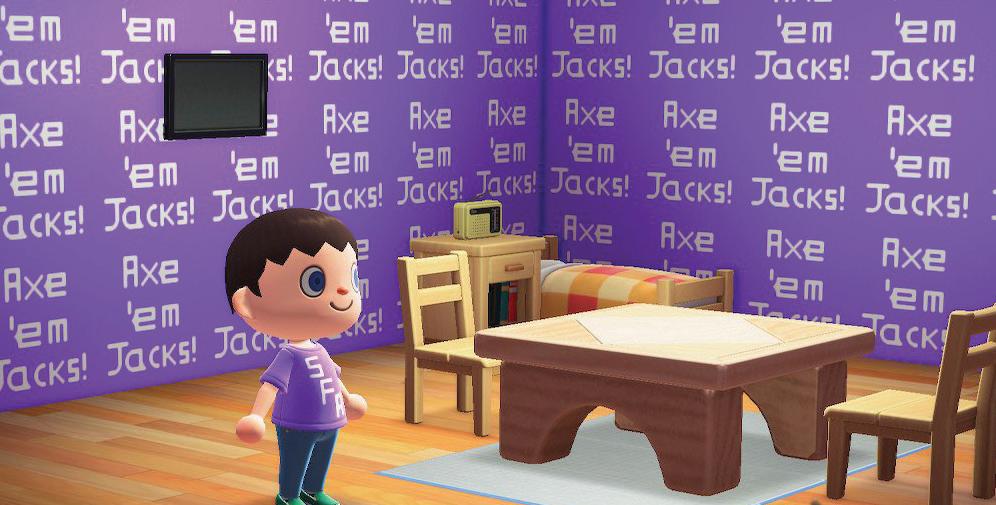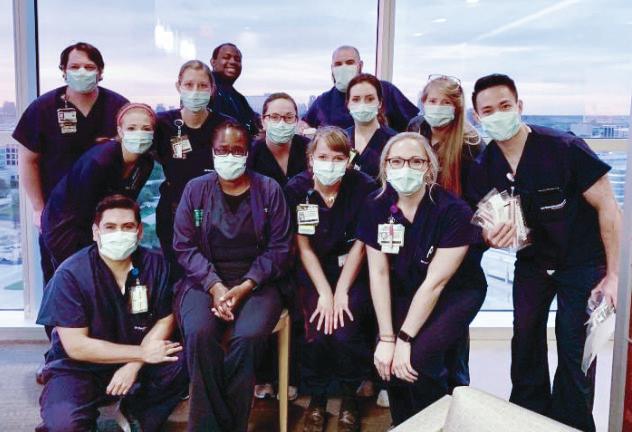
12 minute read
SHIELDING HEROES
STORY BY DONNA PARISH ’99 & ’07
PHOTOS BY HARDY MEREDITH ’81
Advertisement
The employees at National Signs in Houston have reconfigured the manufacturing facility in the wake of COVID-19 to produce face shields, emergency messaging center trailers and other lifesaving equipment.
He then served 14 years as CEO of Core Polymer Moulders, a company that provides engineered rubber products for the oil and gas, aerospace, railroad, truck and trailer, mining, and offshore marine industries.
“After spending 20 years as the CEO for businesses that mainly cater to the oil and gas industry, I was extremely excited for the opportunity to join National Signs,” Johnson said. “As the leading provider of signage and architectural accents and one of the top distributors of LED signs and electronic message centers in the United States, I knew of the employees’ attention to detail and the high-quality products they make. Everyone working here genuinely cares about our customers and our products.”
Julius Lyons, National Signs vice president of operations, said he’s proud of what the employees have been able to accomplish.
“As the pandemic started to unfold in Texas, we were all concerned what the future might hold and if our business would be able to continue operations,” Lyons said. “But after a serious think-tank session, we landed on a couple of ideas we thought could help our country’s immediate needs and started to zero in on which ones we had the capability to produce.”
Working together, employees at National Signs were able to reconfigure the equipment — computerized router tables, vinyl plotters and precision metal-forming machines — to produce face shields and electronic messaging center trailers. They also developed a prototype for a hospital bed that could be used if medical facilities reach bed capacity.
“From the first face-shield design discussion to a finished prototype took about three hours,” Johnson said. “From finished prototype to full production took about 24 hours.”
Part of Johnson’s motivation to make face shields was due to a shortage of PPE at New York City’s Mount Sinai Hospital, where his brother, physician James Johnson ’94, ran a COVID-19 intensive care unit.
“As we know, New York was hit especially hard during this pandemic,” Johnson said. “I knew of the struggles health care workers there were dealing with in getting the equipment they needed. I wanted to do what I could to help alleviate that situation in Texas.”

The face shields are lightweight, one-size-fits-most and easily disinfected. The employees at National Signs can manufacture thousands of face shields per day. They are then delivered to various health care facilities, including the University of Texas Medical Branch at Galveston, where Johnson and his team were able to quickly send 8,500 face shields.
“Early on, we ran very short on face shields,” said Dr. Joan Richardson, chair of the Department of Pediatrics and director of neonatology at UTMB. “After a brief conversation with Cody, National Signs quickly began production of plastic face shields for use in our labor and delivery and newborn ICU areas. The employees of National Signs have been amazing in their rapid response and ability to help us protect our health care workers and patients.”
Other health-care-related entities National Signs has been able to help include Texas Children’s Hospital, Bayside Community Hospital, Laurel Court Continuing Care, South Lake Houston Emergency Medical Services, Windsong Care Center and The Resort at Texas City.
National Signs also has made and delivered face shields to police, fire and sheriff ’s departments throughout Texas.
“During the progression of the pandemic, the Galveston County Sheriff ’s Office began attempting to purchase PPE for staff members,” said Lt. James Roy of the criminal investigation division of the Galveston County Sheriff ’s Office. “It was difficult to get in a timely manner due to nationwide demand. I reached out to Cody, and National Signs was able to deliver 50 face shields to us the same day I called.”
As the United States transitions back to work, National Signs plans to provide PPE to national and state stockpiles, as well as many large American corporations.
“Since the initial crisis began, we have improved our products, pricing and marketing, and we’ve been rewarded with requests for quotes and strong interest for more than 10 million units from the Federal Emergency Management Agency; the state of Texas; Marriott Hotels; United, Delta and American Airlines; the Toronto Transit Authority; and the NFL,” Johnson said.

In addition to face shields, the company is manufacturing electronic messaging center trailers. The EMC trailers allow municipalities, hospitals, restaurants and other businesses to communicate complex messages at maximum social distance using a single- or double-sided digital display mounted on a trailer, which can be towed and set up almost anywhere.
“These devices have multiple communication uses,” Johnson said. “One of the most common is wayfinding. They can be used to help the public navigate entrances and exits for COVID-19 testing. The messages also can be changed remotely, so updates can be posted without having to go outside and further the risk of exposure.”
Acrylic barriers are another product National Signs is making for places where social distancing is not possible. The company designs, fabricates and installs the barriers at checkout counters, reception areas and other locations to help keep people safe. As Texas began to reopen in late April, National Signs installed 60 acrylic barriers at Goodwill stores across Houston and donated 1,000 face shields to help protect its employees and customers.
“I am pleased Cody and his team wanted to help Goodwill’s employees safely return to work,” said Steven P. Lufburrow, president and CEO of Goodwill Houston. “Cody and National Signs’ Vice President of Sales Matthew Nicolay were so kind to offer Goodwillbranded face shields to assist in the safety of our employees and customers. We are blessed with our partnership and the generous gift from them.”
Although it’s difficult to predict where the world will be a year or even a few months from now regarding the pandemic, it’s almost certain COVID-19 will continue to be a threat, and the lifesaving products National Signs produces will stay in demand.
“We’re still making signs,” Johnson said. “That’s the core of our business, but we’re also proud to continue assisting those on the front line fighting this pandemic. It’s rewarding to know the products we make are helping save lives.” ★
Advising 101
Nurses make great Lumberjacks!
BY DR. TAMMY HARRIS ’93 DIRECTOR, DEWITT SCHOOL OF NURSING
THE PAST SEVERAL months certainly have been life-changing for all of us. The COVID-19 pandemic has forever reshaped society. It has affected every aspect of our lives. During this unprecedented time, our Lumberjack family has risen to the occasion. We have united to become a part of the solution.
Our students, alumni and faculty members have helped redesign how elementary and high school students learn, pitched in to sew surgical masks, worked the COVID-19 call center, used their STEM knowledge to design and manufacture face shields for health care workers, and led the front line as doctors and nurses caring for the sick.
I am proud and find it gratifying that the World Health Organization designated 2020 as the “Year of the Nurse.”
There has never been a better time to become a nurse, and here are just a few reasons why. • Industry demand for nurses is rising. and the future is bright. • There are numerous opportunities to specialize in your field of interest. • Nurses experience cutting-edge technology. • The nursing profession offers flexible work schedules and locations. • There is abundant room for career advancement. • Nurses enjoy competitive salaries with good benefits. • Nurses are part of a team that share in rewarding work with a purpose.
The SFA DeWitt School of Nursing is growing and evolving to meet the needs of nurses across the state. Our RN to BSN transition program is designed for registered nurses who have not yet achieved a bachelor’s degree in nursing. If you know a registered nurse who fits this description, I would appreciate your helping us grow our program by pointing him or her our way. We offer an online program with eight-week sessions, competitive tuition packages and supportive faculty members.
In addition, we are here for our nursing alumni who are interested in returning to further their education with graduate degree programs. Both the MSN family nurse practitioner and MSN nurse educator tracks are fully online.
We all know SFA has a long-standing history of educating great nurses. Help us spread the word that Lumberjacks make great nurses, and nurses make great Lumberjacks! ★
CONTACT US AT BSN and RN to BSN programs (936) 468-7700
MSN program (936) 468-7750
Use #AxeEm or #SFAJackTalk on social media.
He’s excited to use his axe pen while completing the word search! #LumberjackFun #AxeEm @SFASU @LAPROFEMONI / TWITTER

Y’all, my professor was up till almost 2 a.m. reworking her classes to be online. You have to remember, this is tough for them, too. Thank a faculty member today. They are working hard behind the scenes. @SFASU #AxeEm @ALT_KEILI / TWITTER
My academic advisor called to check on me today and went out of his way to order me groceries. No one can convince me that I chose the wrong university. @SFASU @LARRIAN23 / TWITTER

Mrs. Midgett is showing her @SFASU Lumberjack pride today for @AVID4College Thursday! #KnightSelfieSpirit @HOWARDMSKNIGHTS / TWITTER

Really fun day as @SFA_Football donating nearly 200 face shields across @SFASU and the Nacogdoches community to help with #COVID19 recovery! We’re doing our part to help #ReopenTexas safely. #WeWantToPlay #AxeEm #RaiseTheAxe @COACHCARTHEL / TWITTER

A little @Crayola chalk goes a long way with my kids and me during this time. @SFASU @sfa_alumni #AxeEm @EWISEGERBER / TWITTER

2020, am I right? @SFA_TWIGGY / INSTAGRAM


SFA grad packages! #classof2020 @SFA_RESLIFE / INSTAGRAM Working on my dream dorm room. Have to represent the best university in the piney woods and the great state of Texas!!! @SFASU #AxeEm #AnimalCrossing @AUSTINHAWKINS22 / TWITTER
Nursing alumna provides vivid view from COVID-19 patient rooms
STORY BY JO GILMORE
Lisa Miller ’14 (middle row, far left) and other COVID-19 unit nurses at UT Southwestern Medical Center in Dallas initially served as the primary nursing providers for patients with the virus. They examined patients using Bluetooth devices while physicians outside the room assessed vitals. Photos courtesy of Lisa Miller
AS ONE OF the nurses working in the “float pool” at the University of Texas Southwestern Medical Center in Dallas, Lisa Miller ’14 goes where she’s needed the most based on patient census and acuity.
At the beginning of March, Miller learned she’d be working in the COVID-19 unit, a group of 20 to 30 rooms blocked off for patients infected with the virus.
“I felt anxious but also grateful for the hospital entrusting me to care for patients with this novel virus,” she said.
When the first “person under investigation” for possible COVID-19 infection arrived at the hospital, Miller received a step-by-step tutorial on how to don and doff personal protective equipment.
First, she had to wash her hands and put on gloves, followed by her booties, gown, N95 mask and face shield. Lastly, she put on her hair bonnet and a second set of gloves. Removing PPE requires an even more methodical process to help avoid infection, Miller said.
“We had a second nurse supervise the donning and doffing of this equipment each time, especially since the highest rate of infecting ourselves occurs when removing our PPE.”
On her very next shift, Miller began taking care of a person under investigation.
At that point, UT Southwestern medical personnel had to wait two to four days for their patients’ COVID-19 test results, so they treated all people under investigation as if they had the virus.
Two nurses were assigned to one patient to ensure the proper use of PPE and limit patient exposure as the nurses switched roles with each patient’s entry. The nurse in the room providing direct patient care directed the “runner nurse” outside the room to retrieve supplies not readily accessible in the room.
“This helped our PPE last longer,” Miller said.
Because of the highly infectious nature of COVID-19, UT Southwestern initially designated Miller and the other nurses in the float pool as the primary nursing providers for patients with the virus and limited access to these patients’ rooms to the nurses.
“That meant we had to learn how to administer respiratory treatments, perfect our phlebotomy skills and embrace the role as a

patient care tech,” Miller said.
This included detailed physical exams using Bluetooth stethoscopes with recording capabilities so that physicians, who stood outside the room to avoid coming into direct contact with the patient, could listen to the patient’s heart and lungs.
“This helps preserve PPE and limits the staff ’s overall exposure to the virus,” Miller said.
Nurses also helped provide emotional support by connecting patients with their families via a conferencing app on the hospital’s TVs.
As the number of positive and ruled-out cases increased, the COVID-19 unit grew to encompass the entire hospital floor, and other UT Southwestern nurses were trained to take care of COVID-19 patients.
“It has been encouraging to see nurses from all different departments come together as we embrace the different daily challenges that have come with this virus,” Miller said.
Because she was one of the first float pool nurses on the UT Southwestern front line, Miller helped train nurses new to the unit and cautioned them to eliminate all outside distractions.
“It’s important to be fully present because the patient is extremely isolated,” Miller said. “Therefore, time with the patient should be efficient and clustered, but also empathetic and caring.”
She warned nurses that forgetting to complete the simplest task could lead to using additional PPE to re-enter a room.
“Preserving PPE is something we all worked diligently to do,” Miller said. “The nationwide shortage of PPE and subsequent rationing of certain PPE items generated a lot of stress and anxiety for nurses.”
She credits SFA’s DeWitt School of Nursing for preparing her to serve during this pandemic.
“It was such an amazing experience and certainly gave me the foundation of knowledge needed to effectively take care of COVID-19 patients,” Miller said.
She believes the pandemic has and will continue to change the nursing profession.
“I’ve noticed nurses from different specialties coming together to support one another and cross-train,” Miller said. “I am hopeful the next nursing generation will be inspired by this pandemic and know that they can help with change and really make a difference.” ★
Taking a Page Out of Poage’s Book

Dr. Frederick Poage ’06 serves as medical director of Amarillo’s Northwest Emergency at Town Square. His team is among the millions of health care workers globally combating the spread of COVID-19.




